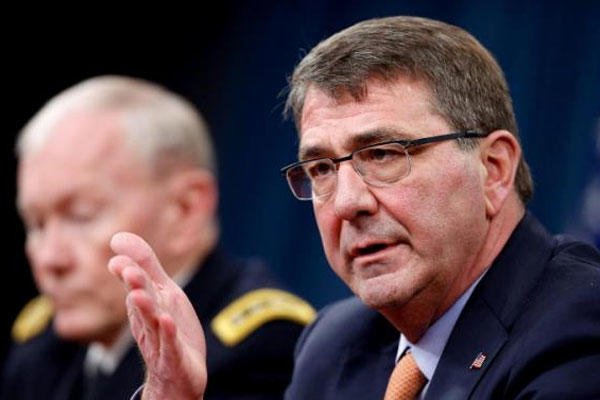As he wraps up his tenure as Joint Chiefs Chairman, Army Gen. Martin Dempsey has sought to fine-tune Defense Secretary Ash Carter's controversial remarks questioning Iraqi Security Forces' (ISF) will to fight following the fall of Ramadi to ISIS.
"It's not a matter of do they have the will to fight, but what are they willing to fight for," Dempsey said in an interview with the Washington Post that was one of several he has done recently as he prepares to retire after 41 years in the Army.
Carter last month told CNN that the ISF showed it lacked the "will to fight" in fleeing Ramadi despite outnumbering the Islamic State of Iraq and Syria (ISIS) fighters.
Dempsey, who led the 1st Armored Division in Iraq and was in charge of training the ISF from 2005-2007, said, "I've got a lot of time in the saddle, as they say, with the ISF. I think what happened in Ramadi demonstrated at the very least some organizational and leadership failures and vulnerabilities."
"I've actually seen them exhibit the will to fight," Dempsey said in an interview with National Public Radio.
"The real question I think that Secretary [Ashton] Carter was contemplating was, 'What do they have the will to fight for?' In other words, 'For what will they fight?' and not, 'Do they have the will to fight?' And it's an important distinction."
Related video:
ISIS Propaganda Machine
The Iraqis "have not yet achieved a national unity government" that can inspire and direct the ISF, Dempsey said, and that failure will inevitably prolong the conflict with ISIS into multiple years.
"The most important line of effort is not the military line of effort, although the military line of effort remains important; it's the governance line of effort," said Dempsey, who will retire as the 18th JCS Chairman in the fall. President Obama has nominated Marine Commandant Gen. Joseph Dunford to succeed him.
Unified Government Required
In various forms, Dempsey has been delivering the same message on Iraqi political unity as the foundation for a successful campaign against ISIS since its fighters pushed out of Syria last June as the ISF fled.
"If we can get a credible partner [in Iraq], then I think we can do any number of things" in the way of support for the ISF, Dempsey said at the Aspen Security Forum last July.
At the same conference, Army Chief of Staff Gen. Ray Odierno echoed Dempsey in blaming the collapse of Iraqi forces on the "politicization" of the Iraqi army along sectarian lines. "They didn't fight," Odierno said of the Iraq troops, because of a "complete lack of trust and confidence, and frankly loyalty, in their commanders."
Without a unity government, "it will continue to disintegrate" in Iraq, Odierno said. "If you don't get that, no national force will solve the problem."
As Dempsey viewed it, the emphasis on political unity was part of the Obama administration's "Iraq first" strategy against ISIS in Iraq and Syria. Sen. John McCain, R-Ariz., and other critics have charged that the administration lacks a strategy, but Dempsey has insisted that there is one -- just not one that the critics like.
The critics have called for sending thousands more U.S. trainers and advisers to Iraq, stepping up the air campaign, and positioning U.S. troops on the front lines as forward air controllers -- all moves that the Obama administration has thus far rejected.
Instead, the administration has stressed political unity in Baghdad backed by U.S. and coalition airpower with a limited training and advisory role for U.S. troops. In Syria, the long-range plan was to train a Syrian opposition force to counter ISIS.
Dempsey cautioned against expecting the training program for so-called "moderate" Syrian rebels to produce units that could go up against ISIS and the regime of President Bashar al-Assad anytime soon.
"That's going to be a challenge and may take longer than we think," Dempsey told the Washington Post.
The military's plan to vet and train Syrian recruits followed on a similar CIA-run program that was scrapped. Under Army Maj. Gen. Michael Nagata, Special Operations commander at U.S. Central Command, the program has been re-started with the goal of fielding a force of 3,000-5000 next year.
In May, an initial group of about 90 recruits began training in Jordan. Training sites were also expected to open in Turkey, Qatar and Saudi Arabia.
Like a Shark
Dempsey has occasionally compared the campaign against ISIS to trying to slow down a shark. To live, a shark must keep going forward and will die if the momentum is stopped. Dempsey and the Joint Chiefs believed that they were slowing ISIS's momentum after the coalition bombing campaign began last Aug. 8, but the fall of Ramadi last month raised doubts about the overall strategy.
For Dempsey, the struggle in Iraq was symbolic of the changing nature of the enemies faced by the U.S. since he graduated from West Point in 1974.
"In my early years as a military officer, issues were a little clearer because they were mostly mechanical. For example, the confrontation that we avoided with the Soviet Union was extraordinarily predictable. We had a set of norms that had evolved over time and we both lived by those norms," Dempsey told Forbes Magazine.
Currently, "you've got a very risky accumulation of state actors, non-state actors, and individual groups that can come together and separate, syndicate with each other over time in ways that are extraordinarily difficult to understand," Dempsey said.
-- Richard Sisk can be reached at Richard.Sisk@military.com.



























